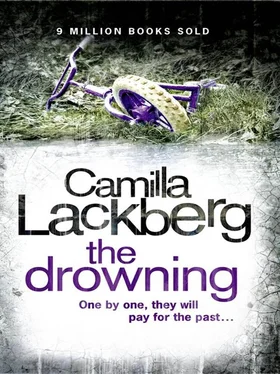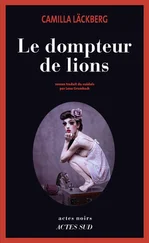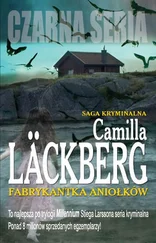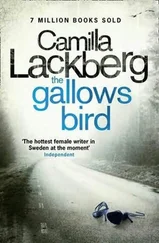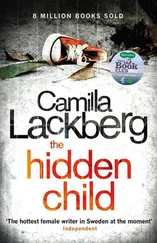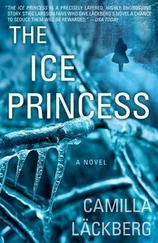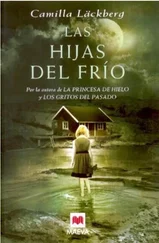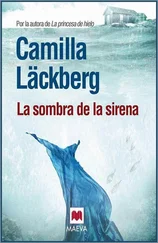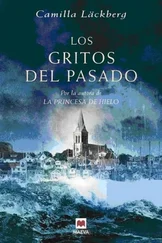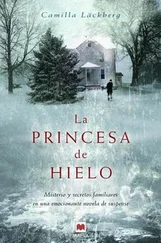Both kids were screaming at the top of their lungs. The sound bounced off the walls in the kitchen, and Christian thought his head was going to explode. He hadn’t slept well for several nights in a row. Thoughts kept whirling through his mind, round and round, as if he needed to analyse every single thought before he could move on to the next one.
He had even been thinking of retreating to the boathouse to sit down and write. But the silence of the night and the darkness outside would have given his phantoms free rein, and he didn’t have the strength to drown them out with the sentences he constructed. So he’d stayed where he was, staring up at the ceiling while hopelessness descended on him from all directions.
‘Stop that right now!’ Sanna pulled the boys apart as they fought over a packet of O’Boy which had somehow ended up a little too close to them. Then she turned to Christian, who was sitting at the table and staring into space, his sandwich uneaten on the plate, and his coffee untouched in the cup.
‘It would be nice if you could help me out a little!’
‘I didn’t sleep well,’ he replied, taking a sip of the cold coffee. He got up and dumped the rest in the sink before pouring himself a fresh cup and adding a dash of milk.
‘I’m fully aware that you’ve got a lot on your mind right now, and you know that I’ve supported you the whole time when you were working on your book. But there’s a limit, even for me.’ Sanna pulled the spoon out of Nils’s hand just as he was about to use it to bang his older brother on the forehead. She tossed it with a clatter into the sink. Then she took a deep breath, as if mustering her courage before pouring out everything that she’d been holding inside. Christian wished that he could press a pause button to stop her before she spoke. He simply couldn’t take any more right now.
‘I never said a word whenever you went straight from work to the boathouse and sat there writing all evening. I picked up the kids from day-care, cooked dinner, made sure they were fed, tidied up in the house, got them to brush their teeth, read them a story, and then put them to bed. I did all of that without complaint while you devoted yourself to your fucking creative efforts !’
Sanna’s last words dripped with a sarcasm that Christian had never heard from her before. He closed his eyes and tried to shut out the criticism. But she went on relentlessly:
‘I think it’s fantastic that everything is going so well. That you got the book published, and that you seem to be a new star on the literary horizon. I think it’s great, and I don’t begrudge you any of it. But what about me? Where’s my place in all of this? Nobody sings my praises, nobody looks at me and says: “By God, Sanna, you’re amazing. Christian is a lucky man to have you.” That’s not something that even you say to me. You just take it for granted that I’ll slave away here at home, taking care of the kids and the house while you do what you “have to do”.’ She sketched two quotation marks in the air. ‘And it’s true. I do handle everything. And I gladly carry the load. You know how much I love taking care of the children, but that doesn’t make the burden any easier to bear. I’d at least like to receive a few words of thanks from you! Is that too much to ask?’
‘Sanna, I don’t think we should let the kids hear…’ Christian began, but he realized at once that it was the wrong thing to say.
‘Right. You always have some excuse for not talking to me, and not taking me seriously! You’re too tired, or you don’t have time because you need to work on your book, or you don’t want to discuss things in front of the kids, or, or, or…’
The boys didn’t make a peep as they stared with frightened eyes at their parents. Christian felt his weariness giving way to anger. This was one thing he detested about Sanna, and they’d discussed it many times before. She never hesitated to draw the children into their arguments. He knew that she was trying to make the boys her allies in the battle that had become more and more vociferous between them. But what could he do? He knew that all their problems were caused by the fact that he didn’t love her, and never had. And the fact that she knew this, even though she refused to admit it to herself. He had actually chosen her for that very reason – that she was someone he could never love. Not in the same way as…
He slammed his fist down on the table. Both Sanna and the boys jumped in surprise. His hand stung from the blow, which was exactly what he’d intended. Pain forced out everything else that he couldn’t allow himself to think about, and he felt that he was starting to regain control.
‘We’re not having this conversation right now,’ he said brusquely. Though he avoided looking Sanna in the eye, he could feel her gaze on his back as he headed for the front hall, put on his jacket and shoes, and went out the door. The last thing he heard before the door slammed shut was Sanna telling the boys that their father was an idiot.
The dreariness of it all was the worst part. Trying to fill the hours while the girls were in school with something that at least seemed to have an iota of meaning. It wasn’t that Louise had nothing to do. Ensuring that Erik’s life ran smoothly left no room for laziness. His shirts had to be hung up properly, laundered and pressed; dinners for his business associates had to be planned and successfully hosted; and the whole house had to shine. Of course they had someone who came in to clean once a week – and who was paid under the table – but there were still things that she needed to tend to herself. Millions of minor matters that needed to be handled impeccably so that Erik wouldn’t notice that any kind of effort had gone into making everything work as it should. But the problem was that it was all so boring. She had loved being home when the girls were little. Loved taking care of her young daughters. She didn’t even mind changing nappies, although Erik had never devoted a single second to that chore. But she hadn’t minded, because she had felt needed. She had a purpose. She had been at the centre of her children’s world, the person who got up in the morning before they did to make the sun shine.
But those days were long gone. The girls were in school. They spent their free time with friends and doing extracurricular activities. Nowadays they regarded her mostly as someone who was at their beck and call. Erik thought of her that way too. And to her sorrow, she was beginning to realize that they were all becoming insufferable. Erik compensated for his lack of involvement in his daughters’ lives by buying them everything they wanted, and his contempt for his wife was beginning to rub off on the girls.
Louise ran her hand over the kitchen counter. Italian marble, specially imported. Erik had chosen it himself, during one of his business trips. She didn’t really like it. Too cold and too hard. If she’d been allowed to choose, she would have selected something made of wood, perhaps a dark oak. She opened one of the shiny, smooth cupboard doors, which also had a cold appearance. More fashion than feeling. To go with the dark oak countertop that she would have preferred, she would have chosen white cupboard doors in a rustic style, hand-painted so that the brush strokes were visible and gave a certain life to the surface.
She cupped her hand around one of the big wine glasses. A wedding gift from Erik’s parents. Hand-blown, of course. At their wedding dinner, she’d been subjected to a lengthy lecture by Erik’s mother about the small but exclusive glass-blowing workshop in Denmark where they had specially ordered the expensive glasses.
Something snapped inside her, and her hand opened as if of its own accord. The glass shattered into a thousand pieces on the black pebble-tile floor. The floor was also from Italy, of course. That was one of many things that Erik had in common with his parents: anything Swedish was never good enough. The farther away the origin of something, the better. Just as long as it didn’t come from Taiwan. Louise sniggered, reached for another glass, and stepped over the shards on the floor, her feet clad in house slippers. Then she made a beeline for the boxed wine on the counter. Erik always ridiculed her boxed wine. For him, the only acceptable wine came in a bottle and cost hundreds of kronor. He would never dream of sullying his taste buds with wine that cost two hundred kronor per box. Sometimes, out of sheer spite, she would fill his glass with her wine instead of the snooty French or South African variety that was always accompanied by long-winded discourses on their particular characteristics. Strangely enough, it seemed that her cheap wine possessed the exact same qualities, since Erik never noticed the difference.
Читать дальше
Конец ознакомительного отрывка
Купить книгу
